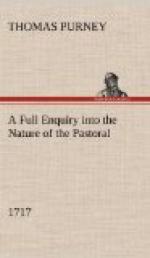Des.) Mine Eyes do itch, doth that boad Weeping?
Emil.) ’Tis neither here nor there.
Des.) I have heard it said so:
O these Men, these Men!
Dost
thou in Conscience think, tell me Emilia,
That
there be Women do abuse their Husbands,
In
such gross kind? &c.
Othello. Act. 4. Sc. last.
But if this passage is too Simple, ’tis for Tragedy so, not for Pastoral; and because DESDEMONA was a Senators Daughter, and Educated in so polite a place as VENICE; but in Pastoral, I think, we may Introduce a Character so Young, Simple and Innocent, that there is no Thought so Simple but will square with it; at least, we have no Instance of any such one as yet. The Simplicity of this Scene would be inimitable for Pastoral; and I think, it shows as great if not a greater Genius, in the Writing it, than any one in SHAKESPEAR. But a Scene so truly Simple and Innocent cannot well be represented. Besides, what is best writ is most open to the Ridicule of little Genius’s; And more, I doubt, look upon this Scene in OTHELLO as Comedy, than have a taste of that sweet Simplicity, that is in it, if we consider the Sentiments only in themselves.
Yet must we not carry the Reflection too far, of Pastoral-Writers having no such thing as the Simple in any of their Thoughts, for there are passages in Mr. PHILIPS Pieces truly Simple. And ’tis worthy Observation how beautiful a figure they make, tho’ we don’t consider ’em as being in a Pastoral. Such is the celebrated one, contain’d in the last of these Lines.
I smooth’d her Coats, and stole
a silent Kiss:
Condemn me Shepherds if I did amiss.
Phllips Past. 6.
But we have greatly more Simple Thoughts in other Pieces than in Pastorals. The finest of all which, is this famous one in OTHELLO.
Why I should fear I know not,
Since Guiltiness I know not: But
yet I feel I fear.
Yet need we not much wonder at the scarcity of these Simple Thoughts; since there is nothing requires so great a Genius as finely to touch the SIMPLE; and the greatest Genius’s never attempt Pastoral; it being a Form so mean, little and trifling, without the Ornaments of Poetry, FABLE, MANNERS, MORAL, &c. and of a confused Imperfect Nature.
CHAP. VII.
Of COMPARISONS in Pastoral. And how much our modern Pastoral-Writers have fail’d therein.
SIMILIES in Pastoral must be managed with an exceeding deal of Care, or they will be faulty. As a Poet may range Nature for Comparisons; this gives a Pastoral-Writer a very easy Opportunity of introducing rural Thoughts. VIRGIL therefore, and those Swains who have written Pastorals more by Art and Imitation than Genius, generally heap three or four SIMILIES together for the same thing; and which is of no Moment; nor wanted any Comparison.




